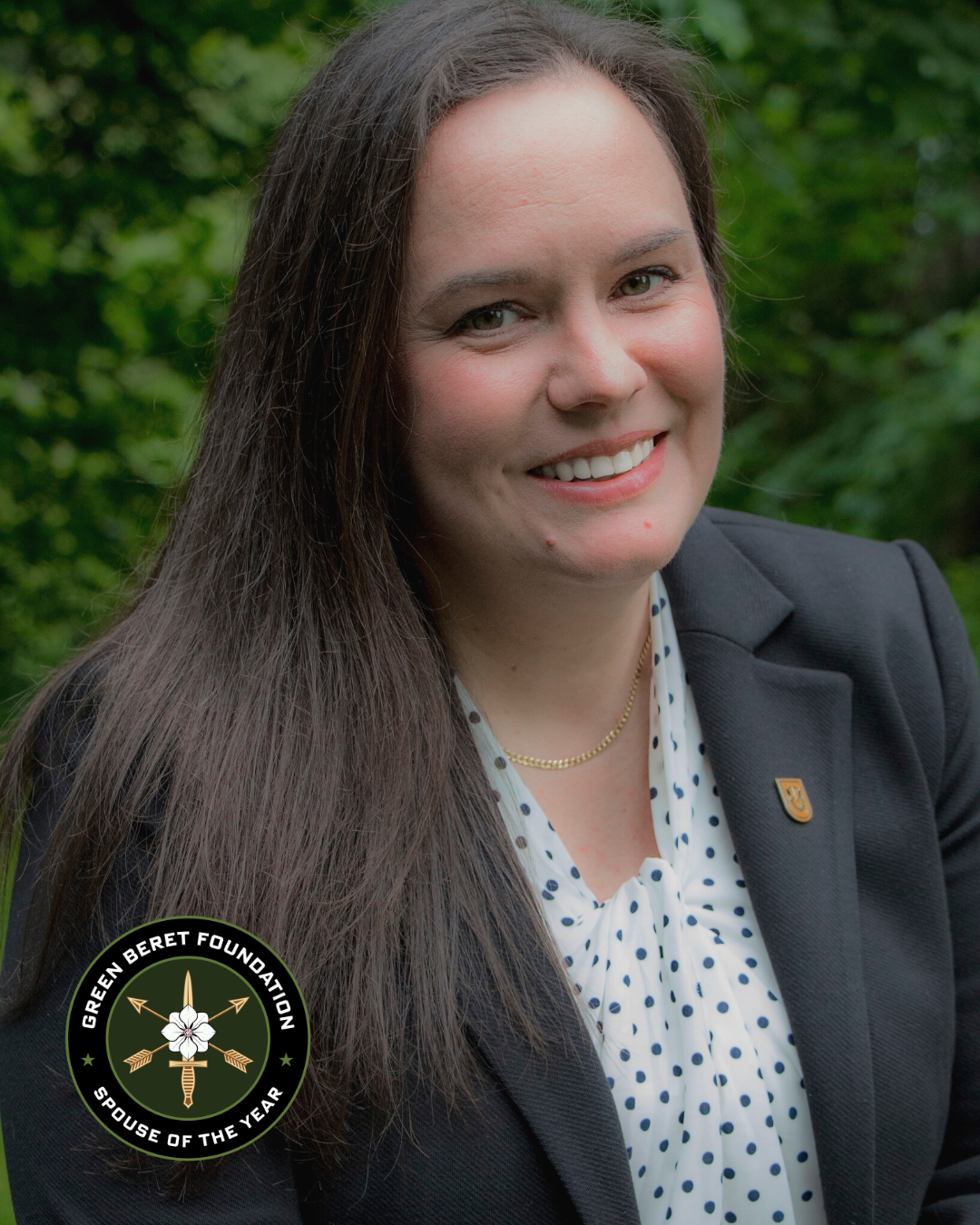

 The Green Beret Spouse of the Year for 2023 goes to Lauren Howard—a distinction created to honor our Green Beret spouses’ dedication, resilience, and sacrifice.
The Green Beret Spouse of the Year for 2023 goes to Lauren Howard—a distinction created to honor our Green Beret spouses’ dedication, resilience, and sacrifice.
Just as the Green Beret motto is “to free the oppressed,” Lauren works tirelessly to ensure that the communities she belongs to do not suffer needlessly due to circumstances beyond their control. Her passion for this cause is demonstrated in two key areas: first, as the parent of three neurodivergent (having brain function that deviates from ‘typical’) children (one of whose diagnoses include other disabilities), she is committed to ensuring that both children and adults in the neurodivergent and disability communities are championed in a multitude of ways; and second, as an Army spouse of 20 years, whose compassion for other spouses feeling lost and unsupported led to her concerted efforts to change this culture.
A native of Washington—born in Seattle and raised in Olympia—Lauren knew that she would have the opportunity to help serve other Green Beret spouses in a unique way when her family returned to Joint Base Lewis McChord from Ft. Bragg in 2013. This was only because of the loneliness, isolation, and disempowerment she had previously experienced as a young mom of a 1-year-old while her husband was completing the Q Course, in a part of the country where her closest friends and family members were hours away in places like DC and Miami. Back at JBLM, she was resolved to ease this journey for other spouses, and so began her mission of service to other SF spouses.
As her husband’s career path took the twists and turns characteristic of Green Beret life, Lauren’s roles changed and evolved, but she stayed the course and has logged over 10,000 volunteer hours for 1SFG(A) over the last decade. She served as both Battalion and Company level Family Readiness Group (FRG, now SFRG) POC roles and, currently, Battalion level Care Team (crisis support) Coordinator. She has also committed countless hours to the FIRST Spouse Mentorship Program, a USASOC-funded effort to ensure that spouses were getting the connection and support that they needed. These efforts answered a concrete need which began a decade ago when USASOC announced that the Family Readiness Support Assistant (FRSAs—contracted civilians supporting unit level family programming) were being done away with in most Army units. It was then that Lauren, along with a team of dedicated spouses committed to these same efforts, worked as a formation to create the FIRST Spouse Mentorship Program.
As FIRST Spouse Mentorship Program grew in size and budget, Lauren adopted a role as “data guru,” conducting extensive research on the measurable impacts that the program was having. This research was critical in presentations to Command, who could then lobby to USASOC to ensure that their programming was adequately funded. What the research showed unequivocally, says Lauren, is that “the program benefited and improved quality of life of Special Forces spouses, helping them feel connected and cared for while providing them with necessary resources.” It also showed that Lauren’s personal mission—to ensure that other SF spouses at JBLM felt more supported than she had previously—was also being fulfilled.
These achievements, on their own, are significant enough. But as Lauren worked tirelessly to uphold her commitment to supporting other SF spouses, another storyline was unfolding in her own family’s personal life. Not long after the family’s return to JBLM from Bragg, while her husband was gearing up for another combat rotation in Afghanistan, Lauren had realized that she was pregnant with her second child. It was during a routine 20-week ultrasound scan that her world was turned upside down: the baby received a prenatal diagnosis of a congenital heart defect that also indicated a strong likelihood that her child would be born with Down syndrome. Amniocentesis confirmed this fact, and the family flew into action pursuing the appropriate education to prepare for their son’s arrival. Eight weeks after his birth, the baby had life-saving open heart surgery in California to correct the defect; one month later, his father deployed to Afghanistan. In 2015, Lauren had a third son; eventually, her eldest and youngest sons would also receive neurodivergent diagnoses.
Through the journey of raising these three neurodivergent boys—today ages 7, 9, and 14—Lauren continued in her service to the Regiment. At the same time, she began to commit herself to advocacy on behalf of the neurodivergent and disability communities. First, by joining the Board of Directors (including holding the President role for 2 terms) of a local non profit (2017-present) that provides early intervention services in 24 school districts in the region and many other supports to families raising persons with disabilities. And, ultimately, in rejoining the workforce in her present work at Sensory Tool House, LLC where she provides consulting, training, support, and advocacy to help increase accessibility and inclusion in the community while managing a neurodivergent and disabled staff.
Through it all, what drives her is something that she heard years ago at her husband’s Q Course graduation. It was the message that every Green Beret is not there for himself, but for the men to the left and right of him. It was at that moment, Lauren recalls making a realization that has since become the driving force behind her efforts to serve: in caring for the spouses and family members of those Green Berets in the Regiment, she is caring for those who are ultimately entrusted with her husband’s life. “I remember hearing them say, ‘You’re here for the soldiers to your left and your right;’” she says, “but shouldn’t the spouses be invested in that, as well?”
We are honored to present Lauren Howard with the Green Beret Spouse of the Year Award for her outstanding dedication, resilience, and sacrifice.
